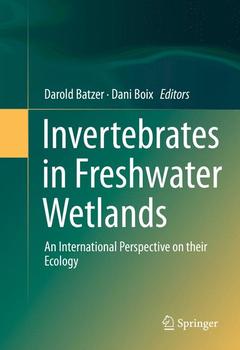Description
Invertebrates in Freshwater Wetlands, 1st ed. 2016
An International Perspective on their Ecology
Coordinators: Batzer Darold, Boix Dani
Language: English
Subjects for Invertebrates in Freshwater Wetlands:
Publication date: 02-2016
Support: Print on demand
Publication date: 03-2018
Support: Print on demand
Description
/li>Contents
/li>Biography
/li>Comment
/li>
1. Introduction to wetland invertebrates ,Darold Batzer (USA), Dani Boix (ESP).- 2. Temperate seasonal ponds Michael Jeffries (UK).- 3. Temporary ponds in Mediterranean climates Dani Boix, Leon Blaustein (ISR), Jamie Kneitel (USA), Allie Mokany (AUS), C. Duchet (ISR), J. Sala (ESP), S. Gascón (ESP), X. D. Quintana (ESP).- 4. Permanent and semi-permanent marshes, Kyle Zimmer (USA), Mark Hanson (USA).- 5. Lake-shore marshes, Matt Cooper (USA), Don Uzarski (USA).- 6. Temperate floodplains, Darold Batzer, Belinda Gallardo (ESP), Andrew Boulton (AUS), Matt Whiles (USA).- 7. Tropical floodplains , Karl Wantzen (FRA), Marinez Isaac (BRA), Mercedes Marchese (ARG), Ines Ezcurra (ARG).- 8. Alpine and montane wetland ponds, Beat Oertli (SWI), Scott Wissinger (USA).- 9. Peatlands Darold Batzer, Terry Wheeler (CAN), Wu Haitao (CHINA), Sue Eggert (USA).- 10. Groundwater springs and seeps, Dudley Williams (CAN).- 11. Rock pools.- Luc Brendonck (BEL), Bram Vanschoenwinkel (BEL), Merlijn Jocqué (BEL).- 12. Beaver wetlands , Bryana Libby (USA), Scott Wissinger.- 13. Everglades , Joel Trexler (USA).- 14. Turloughs, Julian Reynolds (IRE).- 15. Constructed and restored wetlands ,Albert Ruhí (ESP), Winfield Fairhild (USA), Douglas Spieles (USA), Gustavo Becerra-Jurado (IRE), David Moreno-Mateos (FRA).- 16. Managed waterfowl marshes, Josh Stafford (USA), Steven Chipps (USA),.- 17. Synthesis, Dani Boix, Darold Batzer.
Describes the invertebrates of diverse wetlands around the world
Provides a primer on freshwater wetland invertebrates, including how they are uniquely adapted for life in wetland environments and how they contribute to important ecological functions in wetland ecosystems
Features chapters from authors across Europe, North and South America, Australia, and Asia
Includes supplementary material: sn.pub/extras




